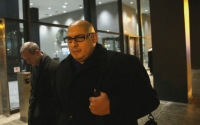Contributor Q&A: Crystal Dilworth on electronic cigarettes
TechKnow: Tell us about your latest segment for the show.
Crystal Dilworth: This story is about e-cigarettes and how popular they are—and whether or not they’re actually toxic. It’s a new nicotine delivery device that’s come over recently to the U.S. and started growing exponentially as a business. So we’re investigating this new type of cigarette and what it means in society—for health reasons, and because they’re not regulated.
TK: What’s your take?
CD: If I was given a choice between a conventional cigarette and an e-cigarette, I would probably choose the e-cigarette—but I don’t necessarily think that that means that they’re healthy or non-toxic. I think that they probably are toxic, but we have yet to see conclusive academic evidence and rigorous study on that.
TK: Sometimes on “TechKnow” you’ve been asked to do stories that are way outside your area of expertise. But on this one, you’re actually in the process of finishing up your PhD at CalTech as a nicotine researcher. Tell us about your work in this field.
CD: I study nicotine dependence at the molecular level. Nicotine binds to a class of receptors in the brain, and that’s what my lab studies—the receptors that binds nicotine. That’s what leads to addiction and dependence. So looking at e-cigarettes as an alternative delivery device for nicotine—like gum and patches—was really interesting to me. There are all these different issues, like how with e-cigarettes you can modify the amount of nicotine that you’re taking in, which is kind of new. Some people are using it for smoking cessation, but not all are. Some just think of it as a “healthier cigarette.” It was really interesting to be interviewing people that vape and to meet other scientists who are doing studies on nicotine from other directions. In the bigger picture, whether or not people are going to continue to smoke conventionally or whether we’re going to move over to more of an e-cigarette model has epidemiological sort of implications for the work that I’m doing.
TK: How was it getting to geek out with researchers you have so much in common with?
CD: When we were at UCSF, our producer, Joanne Shen, prompted me to ask a question of the professor, something like, “Can you say something about how early exposure to nicotine affects the adolescent brain and why is it different for adolescents than for adults?” And I went to ask the question, and I had this really strange moment when I was like, “Wait, no. I’m getting my PhD in this. I am the expert in the room! I am the one here that knows the most about that question!” As a graduate student, you don’t often get those moments where you actually do know more than anyone else in the room. That was this strange moment where I was forced to accept that I will eventually have a PhD and be “Dr. Crystal Dilworth” and people will be asking me questions. So that was kind of cool.
TK: You went to an e-cigarette convention. Was it overwhelming?
CD: In terms of jumping in and just being like, okay, we’re going to immerse ourselves in vape culture, that was probably the most drastic sort of immersion that we could have done—and it was ridiculous. I didn’t really know what to expect. I was going in with an open mind, ready to let people sort of make an impression on me. That happened. There was definitely an impression made.
TK: What kind of impression?
CD: I didn’t know how I felt about regulations, and after the e-cig convention I definitely agree that e-cigs should be regulated. I think that there should definitely be an age limit for how old you have to be to purchase e-cigarettes. I also think that they should be regulating the juice canisters that go into the e-cigarettes mods. Right now there’s really no limit on what concentration of nicotine can go into those canisters, and that is really concerning to me. Also, I don’t think that people should be able to vape in public. I don’t. I know that that’s one of the main attractions for e-cigarettes, that you can vape in the restaurant or in the movie theater. But after being completely surrounded by thousands of people that were vaping and breathing in these noxious, candy-scented fumes, I don’t want to be sitting next to somebody that’s vaping in a movie theater—and I don’t think that I should have to. People claim that the vapor is really just water vapor, but that’s not true. If it is just water vapor, why did it set off the fire alarm? The whole convention was evacuated due to vape setting off the fire alarm. There were clearly significantly greater amounts of particulate in the vapor than just water.
TK: Even before the fire alarm went off, you’d stepped outside for a breather, right?
CD: Definitely. We left the convention center to sit on the benches for the conventional smokers so that we could breathe fresh air. That was ironic, and somewhat sad.
TK: What are some specific concerns you have about the safety of e-cigs?
CD: They say the liquid is mostly nicotine dissolved in propylene glycol, which is a food-safe emulsifier, and then different types of colorings and flavorings are added. I know a lot of the research that has been done has been purely on the nicotine/propylene glycol solution. My concern in terms of toxicity is that no one, I think, has looked at what happens when these “food-safe” flavors and these “food-safe” colors are heated up. There are decomposition products that are potentially toxic. That would be my main concern.
TK: And what about the regulation question?
CD: I’m definitely for regulation in terms of protecting those of us that are choosing not to vape from having to breathe it in, not voluntarily exposing oneself to carcinogens. But I think it’s really sad that when the FDA does regulate it, these small businesses that we saw at the convention, will be most impacted—people with this entrepreneurial spirit that are starting companies and starting to get involved in this mini-economy that’s cropping up in the U.S. around this. I think that once the FDA regulates it, only the large companies—which really means Big Tobacco—are going to be able to afford the tests to prove that they’re safe. We’re going to see the money that could be going to this small business enterprise go to Big Pharma, which is going to be using it as a nicotine-cessation agent, and to Big Tobacco, which is going to be selling it as an alternative tobacco product. That’s going to be a negative side-effect of regulation—but I do think it needs to be regulated.
TK: Bottom line: are e-cigarettes better than not smoking?
CD: They’re not better than not smoking, no. There have been studies that have shown that nicotine can be neuro-protective—exposure to nicotine makes it less likely that you will develop Parkinson’s Disease, or in one study, Alzheimer’s. That’s kind of used as one reason, like, “Well, this is why I smoke e-cigarettes, so I don’t get Parkinson’s Disease!” But I definitely think that not smoking anything is preferable to e-cigs or conventional cigarettes.
TK: What about lung cancer? Are e-cigs any different or better for your lungs?
CD: Well, not getting the combustion products from conventional cigarettes is a big deal. That’s why I said I would take an e-cigarette over a conventional cigarette. But we don’t know what effects it’s going to have on lung cancer—and we don’t know whether in 10 or 15 years we are going to see a really high instance of a new type of cancer that could be traced back to e-cigs use. We don’t know yet.
Watch "TechKnow," Sunday 7:30ET/4:30PT to learn more about e-cigarette culture and the health risks involved with smoking altenatives.
















Error
Sorry, your comment was not saved due to a technical problem. Please try again later or using a different browser.